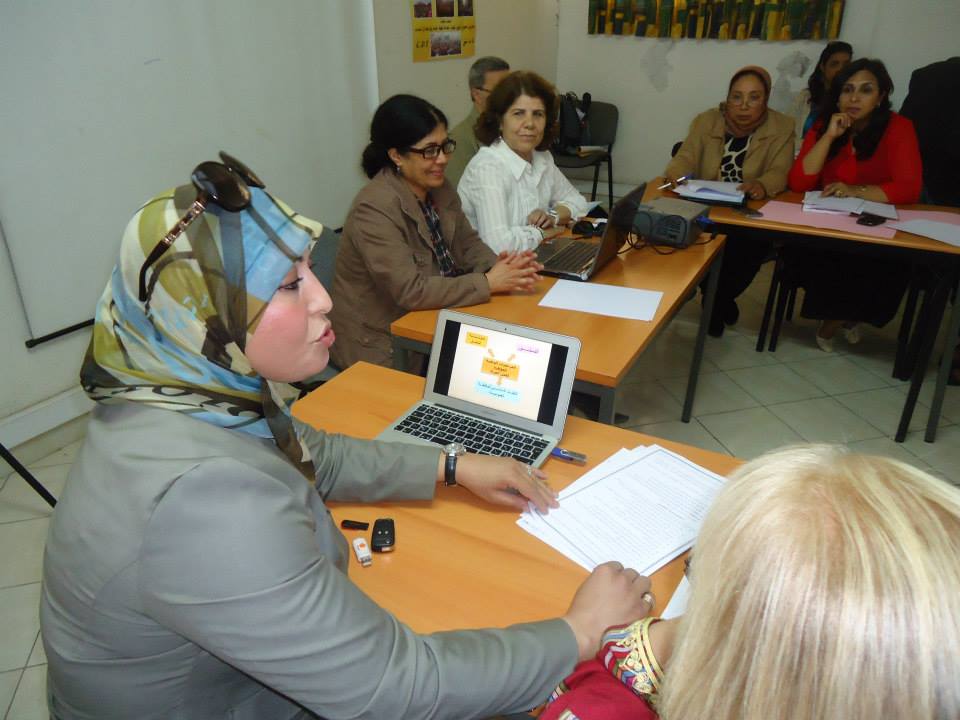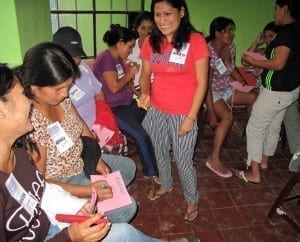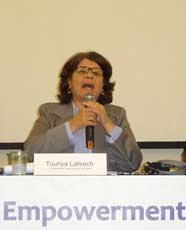
May 16, 2014
On a late September day in the Niger Delta region of Nigeria, hundreds of women from the Egberu, Afam-Ukwu and Afam-Nta communities gathered in Oyigbo.
They had repeatedly tried to talk with the local government council about their dire need for a functional health center but had been ignored. With no health facilities nearby, access to medical care required traveling long distances, a costly expense few impoverished residents could afford, and a journey that further endangered the health of women and their children.
The women marched to the council building that day in 2011 to demand the government meet with them. The council secretary instructed security to lock the gates, but as the guards tried to barricade them, the women pushed the gates open, singing as they did.
They would be heard. Because of their persistence, the council chief of staff met with them and, at their request, asked the state to renovate and update the area’s dilapidated health clinic. The government also built a well-equipped health center at nearby Obuakpu, achievements carried out by community women empowered through a dynamic community coalition, Women Initiative for Transparency and Social Justice (WITSOJ).
Born out of necessity to combat injustices in the Niger Delta, WITSOJ is training and mobilizing women and young people to effectively engage in the democratic political process, hold local lawmakers accountable and achieve concrete goals in their communities. WITSOJ formed in 2007, after a Solidarity Center workshop in Warri, a major oil city in Delta State.
“Women from all Niger Delta states were represented, and we were asked to go back to our communities and ask for social justice,” says Dr. Jennifer Spiff, who heads the organization. Following the Solidarity Center training, more than 200 women from a variety of organizations and communities met in Port Harcourt, and from there, the coalition reached out to additional women-based organizations. Spiff was interviewed as part of a new Solidarity Center report, “Nigeria: Empowering Women, Transforming Society.”
WITSOJ works closely with the national trade union movement, especially with Women in PENGASSAN (the Petroleum and Natural Gas Senior Staff Association of Nigeria). PENGASSAN members have called for transparency in the government’s handling of profits from its vast oil reserves, demanding that oil income fund infrastructure repair and create environmentally safe refineries. The union’s deep roots in local communities adds credibility to WITSOJ. The partnership with the union “gives WITSOJ the leverage to be trusted as an organization owned by the masses,” says Spiff.
Ceciliar Anthony, a farmer who lives in the Kpor community with her husband and three children and who took part in a community campaign for clean drinking water, says “WITSOJ activities brought responses from the leaders who have made firm promises for the first time.”
As a coalition of more than 20 local organizations, WITSOJ regularly taps into the expertise of its members and has the support of clergy. WITSOJ focuses on training women in large part because “women are the most vulnerable and are on the receiving end of social injustice,” says Spiff, WITSOJ coordinator.
“WITSOJ has made women realize the need for gender equality, and that most times, women can become as good ambassadors in leadership as their male counterparts,” says Gold Minimah, an active WITSOJ member.
Victory Goodluck, a farmer from the Ihuike community who has taken part in WITSOJ workshops, agrees. “It is a good strategy to focus on women because women are instruments of change, and WITSOJ has enlightened us to know our rights and the power of women in bringing our desired vision into full manifestation.”
This article is an excerpt from the report, Nigeria: Empowering Women, Transforming Society.” The report is part of Catalysts for Change, a Solidarity Center series supported by the National Endowment for Democracy. The series features the working people, their unions and activists who are advancing worker rights and greater equity in their societies. Their experience and efforts provide real, transferable lessons for others seeking to affect positive change.

May 13, 2014
In Algeria, Tunisia and Morocco, women are taking concrete steps through unions to achieve social and economic justice and decent work, achievements possible when women are substantively involved in decision-making in their unions, their community and civil society.
In Algeria, the Women’s Committee of the Syndicat National Autonome des Personnels de l’Administration Publique (SNAPAP) has reached out to 600 marginalized and vulnerable women across 11 provinces through educational outreach and study circles. SNAPAP leadership recognizes that despite women’s active social and economic participation, they still face blatant discrimination in their workplaces and communities, harassment, violence, and exploitation on the job.
The Women’s Committee runs study circles with the Regional Algerian Women’s Legal Empowerment Network and with support from the Solidarity Center. During study sessions, the women learn their legal rights under national laws and international conventions. They also are supported in overcoming fears that keep them from challenging repression and violations of their rights, even those often condoned by their societies.
Amid ongoing global economic insecurity, millions of workers are struggling to find jobs that pay a living wage—and the most vulnerable are women, who are more likely to toil in jobs without coverage under formal labor law or social protections, leaving them open to discrimination and exploitation.
The study circles provide a safe place where women can freely talk about their experiences. In recent months, they have described ongoing exploitation in the workplace and at home. All have detailed low wages, long working hours, abusive transfers and dismissals, discrimination, sexual harassment, physical violence and a lack of social protection.
A woman union activist from Adrar, in southwest Algeria, describes how women workers struggle economically in the region, despite the country’s oil and gas wealth. To survive in Adrar, some women work in stone quarries using their bare hands to fill trucks with rocks and gravel for private sellers. Three women recently died from dehydration.
“Surprisingly, all the basic rights that women should enjoy, such as health coverage and decent living wages, are not being enjoyed by women of the south. Some women tried to change their situation through training, but their certificate of completion was rejected by all the businesses and enterprises in the south, which led women to be marginalized,” said the activist. She added that the women, “work in an unsafe environment and are vulnerable to harassment.”
In Tunisia, where women are playing a key role in enshrining articles in the constitution that guarantee equality and parity, women in the Union Générale Tunisienne du Travail (General Union of Tunisian Workers, UGTT) are now working to advance women’s roles in their union. They are uniting under the theme, “Partners in social activism, partners in decision-making,” to highlight their essential role in the country’s 2010–2011 uprising and the subsequent democratic transition. UGTT women are campaigning for creation of a quota that would ensure women comprise a minimum percentage of elected officers and members of UGTT decision-making bodies.
Women union members also have been active in UGTT’s push to remove all of the country’s reservations to the United Nations on the Convention on the Elimination on all Forms of Discrimination against Women (CEDAW). These reservations had enabled Tunisia to opt out of certain provisions, including women’s rights within the family, even though the country had ratified the treaty.
The Confederation Democratique du Travail (Democratic Labor Confederation, CDT) in Morocco is laying the groundwork for a gender advocacy campaign to ensure the consistent application and enforcement of women’s rights. The CDT’s Women’s Committee is laying the groundwork to “give more visibility to the demands of women workers.” The CDT released a memorandum, “Work is a right, with guaranteed dignity and equality,” at a well-attended press conference last month and plans a coordinated workers’ advocacy campaign for women workers.
Mar 10, 2014

Violeta co-facilitated a workshop after learning skills from a Solidarity Center-sponsiored training. Credit: Samantha Tate
Rosa Pérez was brought to Lima, Peru, from the country’s Northern Sierra when she was a child to work as a domestic worker. As a young adult, she moved to the farming region of La Libertad to make her own way as an agricultural laborer. Thirty years, four children and five grandkids later, Perez has become a bold advocate for her co-workers. She encourages them to document and speak out about problems such as sexual harassment and inadequate safety and protection equipment and training.
Pérez, secretary of Women’s, Child and Adolescent Affairs of the Camposal Workers’ Union (Sindicato de Trabajadores de la Empresa Camposal), is a leader in a Solidarity Center program to empower women farm workers in Peru. Since 2009, the program, which includes the National Federation of Farm Workers (Federación Nacional de Trabajadores de la Agroindustria y Afines, FENTAGRO), has involved training and advocacy activities with unions representing workers in export-oriented agriculture.
The initiative gained momentum after Pérez traveled to São Paulo, Brazil, last year to participate in the Solidarity Center conference, “Women’s Empowerment, Gender Equality and Labor Rights: Transforming the Terrain.” There, she addressed more than 100 women from around the world and described working conditions for women farm workers in Peru and the actions that her union and FENTAGRO are taking to build a better life for women like her daughter, who works alongside her.
Pérez took the strategies she learned from activists at the conference to the farm worker federation’s leadership Friday, the eve of International Women’s Day. Along with the Solidarity Center, Pérez is recommending that La Libertad’s three unions meet with regional government officials and possibly employers to advocate for literacy programs targeting working women. She also plans to propose an awareness-raising campaign for men and women about sharing domestic and family care. The Solidarity Center has also been working with unions to strengthen their arguments for collective bargaining with employers in support of maternity and breastfeeding benefits that are codified in Peruvian law but not generally enforced.
Following the Women’s Empowerment conference, Perez worked with the Solidarity Center to identify 12 dynamic women from three export-oriented agriculture farms to take part in a Solidarity Center training this year geared toward building women’s confidence and strengthening their leadership skills so they can effectively advocate for women workers’ issues within their unions, their workplaces and their communities.
One of the workers who joined the training, Apolonia, is an elected officer in the Union of Agrícola Viru Workers (Sindicato de Trabajadores de la Empresa Sociedad Agrícola Virú, SITESAV). She grows and harvest fruits and vegetables as part of Peru’s export-agriculture industry, which, in 2013, generated $33 million in exports to the United States. She advises her fellow co-workers, especially young women, about how to stay healthy and build strong families while working between 12 hours and 14 hours a day and earning an average daily wage of $12.
Apolonia and other participants in the two-day training discussed how they can improve workplace safety and other issues and shared their dreams about bettering their workplaces, unions and households.
Two weeks after the leadership training, nearly all of the women who participated in the workshop, including Violeta and María Luna, who had been reluctant to speak in public, co-facilitated small workshops with groups of their peers using the new techniques they learned from the Solidarity Center training, including public speaking and one-on-one-contact to encourage self-confidence and participation.
The La Libertad network of women farm workers now has a compact disk with the stories of 32 Peruvian women leaders they can share in small study circles or at worker assemblies and when training other groups of women. It is the beginning of a much longer process that already has helped a group of powerful women to find their voice and begin to use it.
Sep 27, 2013

Morocco union leader Touriya Lahrech will join women unionists at a gender equality conference in Casablanca. Credit Tula Connell/Solidarity Center
Nearly two dozen women trade unionists from Algeria, Egypt, Jordan, Tunisia and Palestine are set to meet next week for a unique skills-building and strategy conference in Casablanca, Morocco.
The Solidarity Center-sponsored Women’s Regional Advocacy Conference for the Middle East and North Africa region will bring together women leaders from seven union bodies to hone concrete skills, such as communications outreach and message development, and to support union-building initiatives that women leaders have identified as most important. Women representing the gamut of workers—from public sector employees to those toiling on farms—will share and learn strategies for strengthening women’s voices in their unions, their workplaces and in society.
The Sept. 30–Oct 1 conference continues the Solidarity Center’s series of trainings with union partners around the world. The Solidarity Center is committed to helping train women activists to become more effective advocates for gender equality at the bargaining table and within union structures.
In July, the Solidarity Center hosted more than 100 labor and community activists from 20 countries for the two-day conference, “Women’s Empowerment, Gender Equality and Labor Rights: Transforming the Terrain.” Touriya Lahrech was among those taking part, and she will welcome participants to the Casablanca conference. Lahrech is coordinator of the Women’s Department at the Confederation Democratique du Travail in Morocco.
Participating union bodies include: the Egyptian Democratic Labor Congress (EDLC); the Egyptian Federation of Independent Trade Unions (EFITU); the Federation of Independent Trade Unions of Jordan (FITU); the Palestinian General Federation of Trade Unions (PGFTU); Algeria’s SNAPAP; and the Union Générale Tunisienne de Travail (UGTT).
Oct 16, 2012
Women–and the work they do—are central to productivity and economic growth, to breaking the cycle of poverty and to ensuing more inclusive and just societies. Yet too often they face unnecessary barriers and terrible choices when it comes to work. Far from being economically empowered, millions of women around the world, including here Peru, find themselves vulnerable to abuse, exploitation, below-poverty wages and unsafe working conditions. The legal environment either enables their condition or fails to protect them.
More than 200,000 women work in the Peruvian agriculture sector planting harvesting and processing fruits and vegetables—asparagus, avocados and red peppers—that grace American dinner tables. Many are young mothers and migrants from the Peruvian sierra. Vulnerable, uneducated and far from their family, the women work long hours (for which they may or may not be paid) in fields and packing houses where sexual harassment is the norm. They sleep in crowded, improvised housing. And on the work site, they and their children are exposed to toxic fertilizers and pesticides.
Peru’s Agriculture Promotion law, which regulates workers rights in this sector, includes legally mandated employer benefits within the minimum wage, and allows employers to hire workers on short-term contracts that can be renewed as the market need requires.
Additionally, it allows for a cumulative work week, which means that overtime pay is often not paid. The result? A generation of women who are employed in precarious conditions, unable to earn sufficient money to educate themselves or their children.
Peru’s apparel industry, one of the lowest paying sectors in the country, has a majority female workforce. The work is difficult and unstable. Like their sisters in the agriculture sector, workers are hired under short-term contracts, which deny benefits and a reliable income, and guarantee that complaints are rewarded with firing.
However, thanks to U.S.-Peruvian cooperation, some of this country’s most at-risk working women are finding their voice. They are advocating at the workplace for enforcement of labor laws and fair wages. They are fighting for respect and dignity, for economic inclusion and for a fair shot at ensuring that the next generation of workers will be better off than their parents.
USAID and worker-support NGOs like the Solidarity Center have helped Peruvian farmworkers form a new federation of farmworker unions, FENTAGRO, which is working to strengthen labor provisions—currently allowing below-average wages—in the Agricultural Promotion Law. Together with two textile and apparel federations, the FTTP and the FNTTP, Peruvian garment workers are learning their rights and working together with brands, consumer advocacy groups and other public sector stakeholders to improve laws that permit unfair contracting practices.
In Peru as in the rest of the world, the inclusion of women in a country’s economic present and future is vital. This can only occur if their work is valued and fairly compensated and if their rights are respected.




